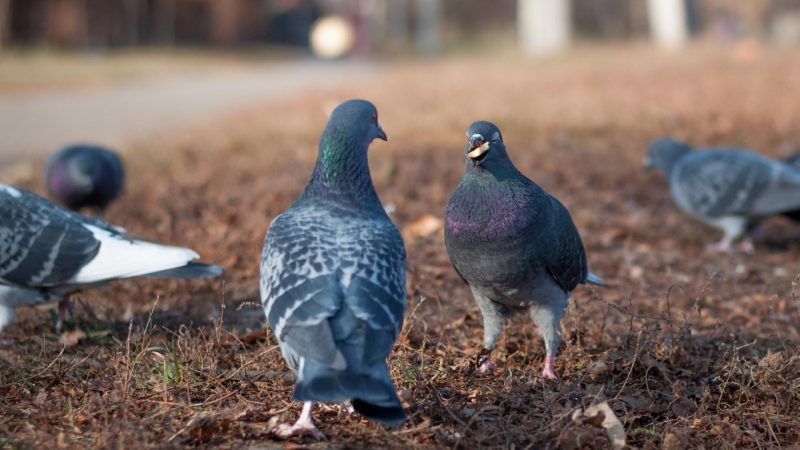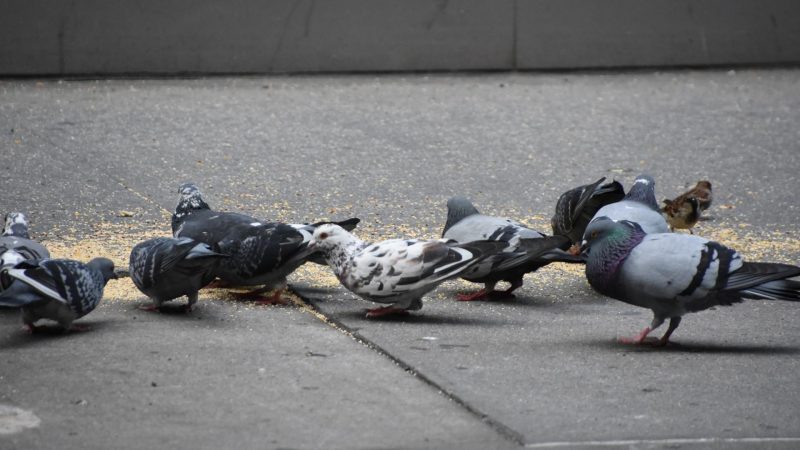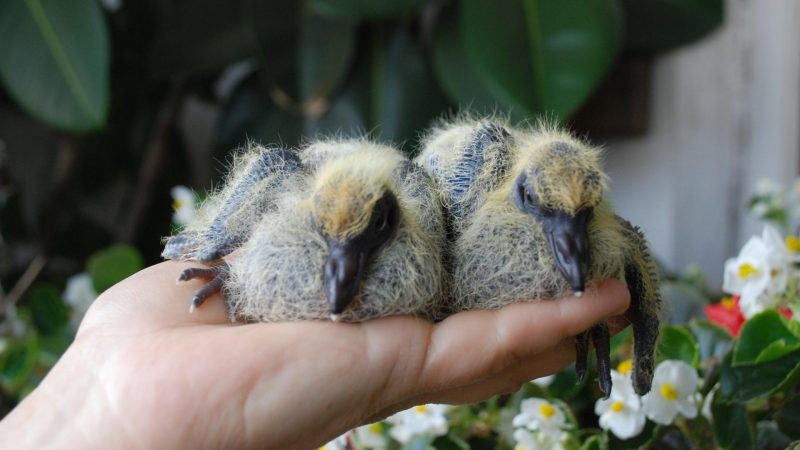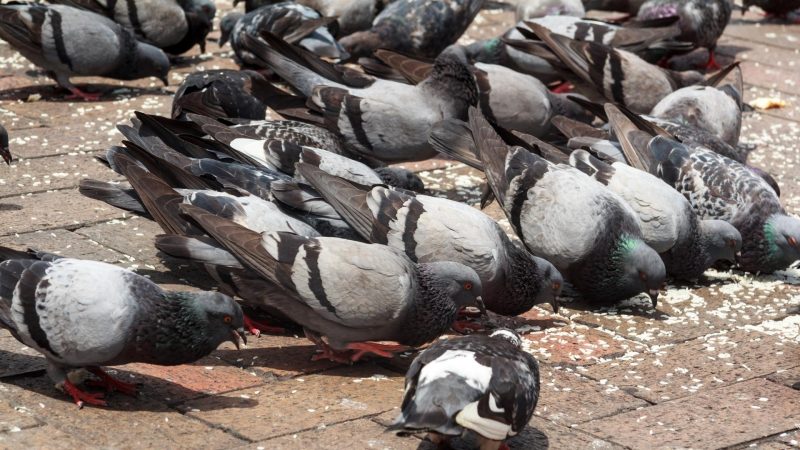Just like doves, pigeons belong to a family of birds called Columbidae. Many people considered pigeons as nuisance pests because they are noisy and usually poop on roofs and busy streets.
On the other hand, some people love to take care of them as pets because they are smart, docile, and very easy to feed.
What do pigeons eat? Pigeons primarily feed on plant matter, including grains, seeds, peanuts, herbs, fruits, and vegetables. But occasionally, they may also eat insects, snails, bird food, and human food. Pigeons in urban areas may also forage through garbage cans and will pick undigested seeds from animal feces.
Generally speaking, pigeons are not picky eaters and may eat almost anything. But then, some foods can harm them. It also does not necessarily mean that you can feed them any time you like.
This article will discuss everything about feeding pigeons and how to stop them from eating your bird food.
Table of Contents
What Do Pigeons Eat In the Wild?

In the wild, pigeons eat cracked corn, grains, grass, sorghum, sunflower seeds, millet, nuts, and wheat. They may also eat fruits, such as apples, pears, and other larger fruits.
Occasionally, wild pigeons may also feed on earthworms, snails, grubs, and small insects. In short, pigeons in the wild eat whatever nature offers.
What Do Pigeons Eat In the City?

Pigeons in the city also eat grains, seeds, and small insects. For pigeons that are already accustomed to people, they may also eat fruits, vegetables, as well as leftover human food.
On the other hand, domesticated or pet pigeons are fed with pigeon pellet diets, bird food, and pet foods, aside from their natural foods.
Do Pigeons Need to Eat Grit?
Pigeons should eat grit, but it is not part of their diet. Grit is basically very small stones, which help pigeons digest food. This is because pigeons have no teeth to grind food in their mouths.
Instead, they swallow grit, which acts like teeth in their gizzards (stomach). But then, too much grit can cause gizzard impaction.
Can Pigeons Eat Rice?
Pigeons can eat rice, cooked and uncooked. According to popular myth, pigeons will explode if they eat uncooked rice. The theory is that uncooked rice will expand inside the pigeon’s stomach once it is mixed with hot water.
Although this is not true, overfeeding rice to pigeons creates a health hazard for them.
Can Pigeons Eat Bread?
Pigeons can eat bread, but it does not necessarily mean you can feed them with bread any time you like. First of all, bread does not have the complete nutritional value that pigeons need.
Thus, too much bread can lead to malnutrition. Feeding pigeons with bread in parks also attract pests and other animals.
Pigeons that are fed with bread are also likely to lose their natural foraging ability. If you feed pigeons with huge pieces of bread, they may choke while trying to swallow them.
But more importantly, pigeons also have a small stomach, so once they are forced to swallow too much bread, it may cause digestive blockages.
Can Pigeons Eat Porridge Oats?
Pigeons can eat porridge oats but only the uncooked ones. This is because cooked porridge oats are very sticky and could solidify around the beak of pigeons.
Meanwhile, uncooked porridge oats are great alternatives for bird food, especially during winter. However, feeding should only be done in moderation.
Do Pigeons Eat Acorns?
Pigeons eat acorns but can potentially poison them. Being the fruit of oak trees, an acorn is an edible nut but should be eaten with extra caution.
This is because acorns contain complex chemical substances called tannins, which have a bitter taste and can be very toxic when consumed in huge amounts.
Tannins are considered anti-nutrient, which means they can block the ability of a body to absorb nutrients. Therefore, eating too much acorn is very dangerous for pigeons.
In fact, a study has confirmed that two pigeons died after eating green acorns, which contain high concentrations of pyrogallol, a type of tannin.
Do Pigeons Eat Goldfish?
Pigeons don’t eat goldfish. They are generally herbivores, not carnivores, which means they eat plants, not animals. Nevertheless, some urban pigeons are omnivores.
Therefore, they will eat fish, meat, and fried chicken. But don’t worry, pigeons cannot swim and won’t dive into an aquarium to eat live goldfish.
What Do Baby Pigeons Eat?

Baby pigeons (squabs) feed mainly on a nutrient-rich substance called “pigeon milk.” Also called crop milk, pigeon milk is produced by both male and female pigeons days before an egg is hatched.
Unlike mammals that produce milk from their mammary glands, pigeons produce milk from the special cells in their crop.
Interestingly, crop milk contains more fat and protein than cow’s milk or human milk. Pigeons feed their squabs with pigeon milk from their beak to their baby’s throat.
This “milk feeding” takes place during the baby pigeon’s first week or 10 days of life. Squabs fed with pigeon milk have a 38% increase in growth rate.
Aside from regurgitated food, squabs may also start eating small seeds and fruits in their third week of life.
However, baby pigeons still cannot open their mouths yet, so the food should be mixed with water and must be fed with a syringe with a tube. Young pigeons may also be fed with commercial bird food for young birds.
Can Baby Pigeons Eat Bananas?
Baby pigeons can eat bananas just like baby birds do. Bananas are very rich in potassium, protein, fiber, and other nutrients that squabs need as they continue to grow.
Aside from that, bananas are delicious, soft, and easy to digest. However, bananas should be given in tiny consumable pieces and moderation.
How Much Does a Pigeon Eat per Day?

Pigeons eat about 12-20% of their body weight each day. For pet pigeons, around 50% of their diet should consist of pellets or a high-quality seed mix.
Each pigeon should be fed with 2 tablespoons of pellets and seeds of equal amounts every morning. Pigeons should drink water 5-8% of their body weight every day.
Can Pigeons Eat Too Much?
Pigeons can eat too much, especially if they like the food. Nevertheless, overeating is very hazardous and can cause gastrointestinal problems.
Giving too much food to pigeons can also cause overcrowding, which promotes the spread of disease among them. Pigeon poop can also cause disease to humans.
How Often Do Pigeons Eat?
Pigeons eat as many times as they can, but you should only feed them once a day or every morning. Ideally, you should give them only the exact amount of food they can finish within the day.
If there are leftovers, reduce the amount of food the next day. Excess food in feeders also attracts pests such as rats and squirrels.
How Do I Stop Pigeons Eating My Bird Food?
Pigeons can be nuisance pests if you have pet birds. They are usually bigger than garden birds and can intimidate them. Pigeons don’t attack or harm smaller birds, but they will eat their food in the bird feeders.
But because you don’t need to kill them, here are some ways to stop pigeons from eating your bird food:
- Pigeons love eating on the ground, so avoid using ground feeders or remove them now and then. But better yet, use hanging feeders or put them on top of a pole.
- Pigeons are excellent scavengers, so remove spilled seeds immediately. Otherwise, a flock of pigeons will suddenly appear.
- Don’t place garbage cans, leftover pet food, and other sources of food and water near your bird feeders.
- Destroy pigeon nests that are near your house. Although this may sound inhumane, pigeons can still build another nest far away from your property.
- Use small bird feeders with a feeder tube, such as Gray Bunny Bird Feeders for Outdoors Hanging. This tube feeder is chew-proof and has six short metal perches that pigeons cannot land on.
- Use pigeon-proof bird feeders such as Squirrel Buster Standard Squirrel-proof Bird Feeder. Such products automatically close the shroud every time a squirrel, a pigeon, or a heavier bird tries to perch.
- Choose a bird feeder with a dual baffle-weatherguard such as Birds Choice NP436 Bird Feeder. This product has four aluminum ports that only small birds can perch.
- Owls are among the natural predators of pigeons. But instead of using a real owl, place a fake owl such as Dalen Gardeneer Solar Owl. This plastic owl looks like a real owl and can rotate its head 360° with no battery needed. For better results, move it to another place frequently.
- To prevent pigeons from landing on your roof, install non-toxic, sticky transparent gel such as Bird-X 54-1 Proof Bird Repellent Gel.
What Do Pigeons Hate?
Pigeons hate seeing their natural predators, which include owls, eagles, falcons, hawks, and other birds of prey. Most of them also hate cats and dogs because of their predatory instincts, although some pet owners can have them together without issues. Wild pigeons hate snakes because they eat their eggs.
Some people claim that pigeons hate the strong smell of garlic, onion, mothballs, perfume, vinegar, and some essential oils such as cinnamon, cumin, and peppermint. Although pigeons can smell their way back home, no scientific studies are proving that they hate the scent of some essential oils.
Best Pigeon Foods
So far, the best pigeon foods are grains and seeds, but they may also be fed with grasses, peas, berries, fruits, vegetables, and sometimes, chicken and fish. But if you have pet pigeons, you might want to add some commercial pigeon feeds as a supplement to their daily diet. Here are some of the best pigeon feeds:
1. Hagen Pigeon & Dove Seed, Nutritionally Complete Bird Food
Specifically designed for doves and pigeons, this Hagen Pigeon & Dove Seed was cleaned with air before polishing, making it dust-free so that your pet birds will eat all of them. This seed diet contains high-quality seeds of canary grass, cracked corn, red millet, red milo, white millet, whole wheat, among others.
2. Deluxe No Corn Racer Pigeon Mix
Proudly made by Des Moines Feed, this Deluxe No Corn Racer Pigeon Mix is designed for racing pigeons such as Bald Head Roller, English Carrier, Racing Homer, and Show Racer. This 8-pound high-protein mix contains around 62% carbohydrates and 17.5% protein, making it ideal as a race pigeon conditioner.
3. Vita Sunscript Dove Pigeon 5# – Sunscription
Manufactured by Sunseed, Vita Sunscript is fortified with calcium, Vitamins A, D, E, fatty acids, and probiotics for your pigeons’ nutritional needs. Made in the USA, this tasty seed mix contains a long list of ingredients that help pigeon growth, promote skin health, boost feather formation, and support their digestive system.
4. Brown’s Bird Lover’s Blend Dove Food
Although designed for birds, this Brown’s Blend Dove Food is also ideal for all species of doves, pigeons, and quails. It has all-natural ingredients such as red millet, canary seeds, green peas, wheat, white millet, and safflower seeds. This very delicious pigeon feed has balanced nutrients for stronger and healthier birds.
Summary
The anatomy of pigeons can adapt well to various situations, and their diet composition mainly depends on their location. But despite being opportunistic scavengers, pigeons may also get sick once they eat the wrong food. So, the next time you see them in parks, don’t feed them and let them eat naturally.